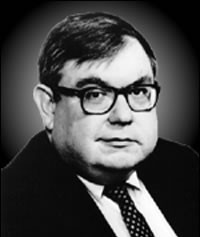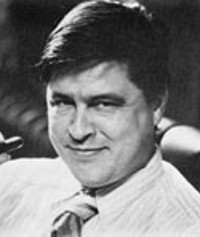 Samuel T. Francis
Samuel T. Francis
Championing
Western Civilization
and the great legacies of
Sam Francis and Joe Sobran
and their allies
 Joseph Sobran
Joseph Sobran
FGF Op-Ed
Samuel Francis Classics
February 21, 2023

What if Strom Thurmond
(or Goldwater)
Had been Elected President
by Samuel T. Francis
Fitzgerald Griffin Foundation
Publisher’s Note: It has been 18 years since Sam Francis, an FGF Founding Board Member, went to his eternal reward. His brilliance can be seen in this classic column, originally written in 2002.
Samuel Francis Classics, 2/21/2023 — For one brief shining moment, it was beginning to look like Senate Majority Leader Trent Lott was taking hormone shots. First he endorsed sending troops to the border to resist invasion by illegal aliens. Then, last week, at a birthday party for 100-year-old Senator Strom Thurmond he virtually endorsed the South Carolina senator’s presidential campaign 54 years ago — as a segregationist.
Mr. Lott has now apologized at least twice and cringed and groveled appropriately for saying something that deviates from egalitarian dogmas, but whether Mr. Thurmond’s distinguished colleague from Mississippi was trying to utter some serious thoughts or had just swallowed too much eggnog at the birthday bash seems an open question.
Had Strom Thurmond been elected president in 1948, paragons of legal reasoning such as Earl Warren and William Brennan would never have seen the inside of the Supreme Court.
No sooner had his words escaped the senatorial lips than he was denounced by Jesse Jackson, Al Sharpton, the Washington Post editorial page and—the world’s greatest expert on What Should Have Been— Al Gore. Alerted by the baying of the leftist pack from which they take their cues, neo-conservatives like the Weekly Standard’s Bill Kristol and the failed and forgotten Jack Kemp soon chimed in.
Mr. Jackson demanded that Mr. Lott resign as Majority Leader, while Mr. Sharpton denounced his remarks as “blatant racism” and vowed to wage a national campaign against him. Mr. Gore, in his ponderous way, held that what Mr. Lott said was “fundamentally racist,” “divisive,” and “divisive along racial lines.”
But of course, Mr. Lott said nothing whatever about race, and never even mentioned race at all. What exactly he did say was:
“I want to say this about my state: When Strom Thurmond ran for president, we voted for him. We’re proud of it. And if the rest of the country had followed our lead, we wouldn’t have had all these problems over all these years.”
Judicial precedents that consolidated the Court’s immense power today would never have been established.
What exactly Mr. Lott meant by his remarks remains unclear, but several different interpretations of them are possible, and Mr. Lott and his defenders have invoked all of them. Nevertheless, what Mr. Thurmond’s States Rights Party mainly stood for was racial segregation, and Mr. Lott knows that. The party was set up in protest of the Truman administration’s endorsement of legislation against segregation, and those who supported the Thurmond candidacy — nearly 1.2 million voters — almost certainly did so because they supported segregation.
So, was Mr. Lott right? If the rest of the country had voted for Strom Thurmond in 1948, would we “have had all these problems over all these years”? Well, you never know, of course, but probably not.
In the first place, had Strom Thurmond been elected president in 1948, such paragons of legal reasoning such as Earl Warren and William Brennan would never have seen the inside of the Supreme Court. Not only Brown v. Board but also the Miranda, Escobedo, and several other major decisions that revolutionized American government and tossed much of the Constitution in the office shredder would never have soiled the law books. Judicial precedents that consolidated the Court’s immense power today would never have been established.
Mr. Lott should ask his critics if it would be OK to say he wishes Barry Goldwater had been elected president in 1964. Mr. Goldwater, though not a segregationist, voted against civil rights legislation for precisely the same reasons Mr. Thurmond gave — it violated states rights.
What we almost certainly would not have enjoyed had Mr. Thurmond become president [include] …the tidal wave of black crime against whites that is now commonplace.
Would racial segregation have survived? De jure segregation was eroding in the southern states anyway. De facto, most sociologists will tell you the nation’s schools today are at least as segregated as they were in the 1950s. So are housing patterns. So what? People of the same race tend to prefer each other’s company.
But what we almost certainly would not have enjoyed had Mr. Thurmond become president are the fruits of forced racial integration as it was imposed in later decades: the tidal wave of black crime against whites that is now commonplace; black race riots from Detroit and Watts to Los Angeles in 1992; the virtual destruction of American cities as a black underclass, protected by the federal government, pushed out whites terrified for their own lives and those of their families; the destruction of American education and the transformation of the schools into day-time prison camps for hoodlums. No forced busing; no affirmative action; no “hate crime” hypocrisy; no “Afrocentric” or “multiculturalist” garbage poured into our children’s heads. Probably no mass immigration. No self-hate for whites. No guilt. No fear.
There’s little reason to doubt the United States and much of the rest of the world would be better off than they are today under the reign of terror and chaos that prevails as the chief legacy of liberalism.
In fact, had the conservatism of a younger Strom Thurmond prevailed, there’s little reason to doubt the United States and much of the rest of the world would be better off than they are today under the reign of terror and chaos that prevails as the chief legacy of liberalism.
Instead of denouncing Mr. Lott, Americans — liberal and conservative, black and white — ought to think hard about the important and unsettling truth he accidentally uttered.
###
Copyright @ 2025 Fitzgerald Griffin Foundation. All rights reserved. This article was published originally for Creators Syndicate on December 12, 2002.
Samuel T. Francis, Ph.D. (1947-2005) was a brilliant writer, author, and historian. He was a nationally syndicated columnist whose articles and review appeared in major U.S. newspapers and magazines.
Books by Samuel Francis include Power and History: The Political Thought of James Burnham; Revolution from the Middle; Beautiful Losers; America Extinguished: Mass Immigration and the Disintegration of American Culture; and the 794-page magnum opus, Leviathan and Its Enemies, published posthumously in 2016. There are two anthologies of his writing: Shots Fired: Sam Francis on America’s Culture War (FGF Books, 2006) and Race and the American Prospect: Essays on the Racial Realities of our Nation and Our Time (Occidental Quarterly, 2006).
While serving as deputy editorial page editor for the Washington Times, Dr. Francis received the “Distinguished Writing Award for Editorial Writing” from the American Society of Newspaper Editors in both 1989 and 1990. He was also editor-in-chief of the Citizens Informer; and associate editor of The Occidental Quarterly: A Journal of Western Perspective on Man, Culture, and Politics.
FGF Books, the publishing arm of the Fitzgerald Griffin Foundation, will be soon be publishing Leviathan and Its Enemies, Abridged.
Help FGF Books in publishing Leviathan Abridged (2024) and the works of Samuel Francis.
Or send a check to: Fitzgerald Griffin Foundation344 Maple Avenue West, #281
Vienna, VA 22180
1-877-726-0058
publishing@fgfbooks.com
Or call us toll-free at 1-877-726-0058